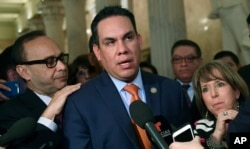Two signatures. That's all that's needed to force a wide-ranging House debate — and votes — on border security and the immigration status of 700,000 undocumented young people brought to the U.S. as children.
Since moderate Republicans opposed House leadership two weeks ago with a rare discharge petition to force a so-called "queen of the hill" debate (House rule based on the most votes) on immigration, the measure has steadily accumulated support within their own party. The petition needs 218 signatures to start that debate and — with the assumption that all 193 House Democrats will sign on — Republicans need just two more signatures.
But that effort now goes on hold as Congress leaves town for an 11-day holiday recess, giving all sides breathing room to figure out what comes next. Many of the 23 Republican signers of the petition face tough re-election races in their districts this November.
The debate over Deferred Action for Childhood Arrivals (DACA) recipients has challenged lawmakers since last September, when U.S. President Donald Trump ended the program, calling on Congress to find a permanent legislative solution.
Lawmakers will return to Washington facing an immediate deadline. Representative Jeff Denham, a California Republican who is one of the leaders of the petition effort, told reporters that June 7 would be the absolute last moment to allow the petition to mature before lawmakers run up against a seven-week summer recess.
Denham said talks with House leadership and the House Freedom Caucus, a conservative voting bloc seeking significant security concessions in return for a citizenship path for DACA recipients, have been productive.
"We've had an agreement in principle," Denham said of a deal that would provide a 12-year path to citizenship for DACA recipients, known colloquially as Dreamers. "Now it's trying to put that information on paper. So, assuming we can continue to move forward, that is something we would bring to our conference on the 7th when we have our two-hour immigration meeting, but we're prepared to move the votes if the talks break down."
But it's debatable whether a bill that makes it through the House "queen of the hill" process can survive the Senate to reach Trump's desk to be signed into law. House Speaker Paul Ryan has repeatedly described the effort as "futile," arguing that he wants to bring an immigration bill up for a vote that has a real chance of passage.
"There's a real sense of trying to come together with a variety of opinions and find some bill that gets to 218 [votes]," Representative Mark Meadows, a North Carolina Republican who is chairman of the House Freedom Caucus, said outside a weekly Republican meeting Tuesday.
The Freedom Caucus supports legislation put forth by Representative Bob Goodlatte, a Virginia Republican. It's a conservative approach to DACA recipients that also features significant funding for border security and a sharp cutback in legal immigration.
All sides will have to make major concessions to gather enough support, since the Goodlatte bill would not get support from House Democrats.
"The details matter," Representative Pete Aguilar, a California Democrat who is one of the co-sponsors of a bipartisan solution for DACA recipients, and a signer of the discharge petition that could bring a bill to the House floor, told reporters Thursday. "It seems right now that they just keep getting bogged up on whether Dreamers should have a path to citizenship. It seems like they're never going to get to a bill in their conference that gets to 218."
The discharge petition puts House Democrats in the unusual election-year position of supporting an effort that could help their Republican colleagues' re-election bids. But after months of inaction, Aguilar told reporters policy, not politics, is the concern right now.
"We've got to worry about helping those hundreds of thousands of young people in our communities who live with uncertainty and anxiety. They're not worried about the political season coming up," he said. "It's our job to fix it for them."






